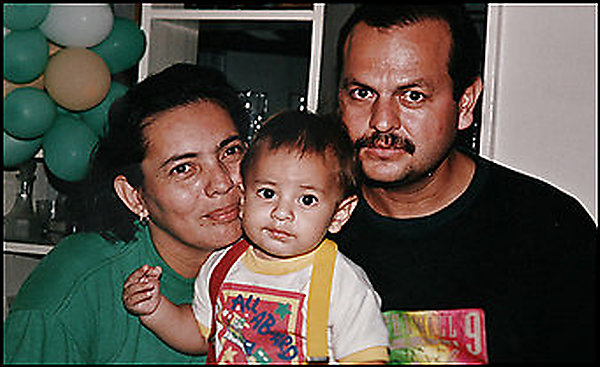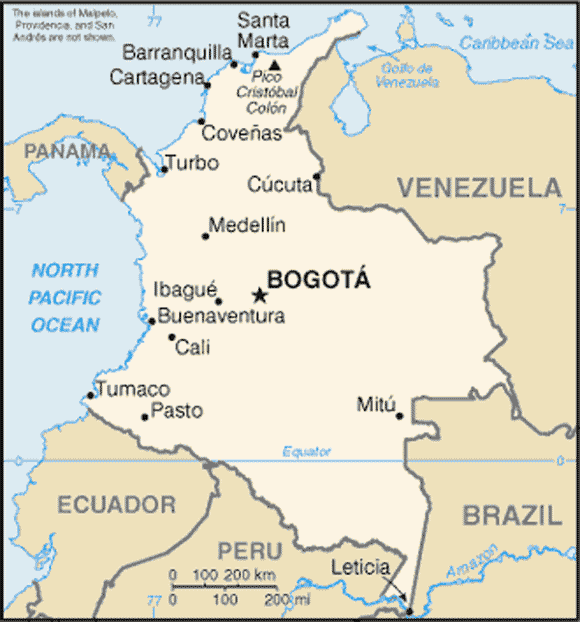Ilankai Tamil Sangam30th Year on the Web Association of Tamils of Sri Lanka in the USA |
||||
 Home Home Archives Archives |
Unionists' Murders Cloud Prospects for Colombia Trade Pactby Juan Forero, Washington Post, April 10, 2007
SANTA MARTA, Colombia -- Zully Codina was a mother, veteran hospital worker and union activist. The last role was the one that cost Codina her life at the hands of paramilitary death squads, whose records show they collaborated with the country's intelligence service to liquidate her and other union activists. Codina was killed on Nov. 11, 2003, when a gunman pumped three bullets into her head moments after she kissed her family goodbye and walked out of her Santa Marta home. Her murder remains unsolved, as do those of the vast majority of the 400 union members killed since President Álvaro Uribe took office in 2002. "For me, her death has been irreparable," said Rafael Sanchez, Codina's husband. Recent disclosures about the purported role of the Colombian intelligence service, the Administrative Security Department, or DAS, in the murder of Codina and several other union leaders has ignited a political firestorm here that is reaching Capitol Hill just as the Bush administration is fighting for congressional approval of a free-trade pact with Colombia, the third-largest recipient of U.S. aid. Some U.S. lawmakers have already voiced concerns. "You cannot put together a free-trade agreement when there isn't freedom for workers in terms of their basic international rights," said Rep. Sander M. Levin (D-Mich.), chairman of the House Ways and Means subcommittee on trade. A clandestine paramilitary operative named to DAS by Noguera said in a recent interview that the intelligence service compiled lists of union members, along with details about their security, and handed them over to a coalition of paramilitary groups known as the United Self-Defense Forces of Colombia. "This list went to Jorge Noguera, and he made sure it reached the Self-Defense Forces," said the operative, Rafael Garcia, now in jail and working with prosecutors. "The DAS knows the movements of union members." Noguera coordinated Uribe's run for the presidency in coastal Magdalena state in 2002 and was rewarded with the top job at DAS when Uribe won the election. As the scandal enveloped the agency, Uribe vigorously defended Noguera, calling him "an uncontaminated man and good person" and then naming him consul in Milan, Italy, when the allegations surfaced. Uribe now says he did not know about Noguera's paramilitary ties. "When he left the DAS, there were no charges of ties with paramilitarism," Uribe told reporters last month, standing next to President Bush during his visit to Bogota. Uribe's government is the Bush administration's closest ally in Latin America and has received billions in U.S. aid to curtail violence. But in the midst of intense lobbying in Washington for a trade pact, Uribe has been buffeted by a widening scandal that has linked two dozen current and former congressmen, most of them the president's allies, with paramilitary groups. "I think the trade pact is in jeopardy," said Rep. Jim McGovern (D-Mass.), who recently met with union leaders in Colombia. "With each passing day, it goes higher and higher. It goes to military leaders, the head of the secret police and prominent politicians. I don't know how far this leads, but it's too close for comfort." The disclosures are now reaching two American firms here. An Alabama coal company, Drummond, is being sued in U.S. District Court by Colombian workers who accuse company executives of contracting with paramilitary groups to kill three union leaders. Colombian prosecutors are also going to investigate the smuggling of 3,000 assault rifles in 2001 to a Chiquita Brands International dock in northern Colombia; the weapons wound up in the hands of paramilitary fighters, according to an extensive report by the Organization of American States. The government says its recent disarmament of thousands of paramilitary fighters has reduced the killings of union members, with far fewer slain than in the 1990s, when in some years more than 200 died. A new unit in the attorney general's office is investigating 200 high-profile murders of union members, and a $25 million protection program has three times the budget it had in 2002. "We have been successful in many ways," Vice President Francisco Santos said in an interview. "Obviously with the DAS case, it hinders our position, but to tell you the truth, I can show day in and day out that during the first four years at least 20 percent of my time as vice president was dedicated to union leaders, to protecting them." Even so, 72 union leaders and activists were murdered last year, making Colombia by far the world's most dangerous country for trade unionists, according to the National Union School, a labor research group in Medellin, Colombia's second-largest city. Of 2,100 murders of union members since 1991, there have been only 30 convictions. Paramilitary documents seized by authorities bolster allegations that intelligence operatives worked closely with the paramilitary groups. One lengthy document, under the heading "Information DAS Friends," lists union members murdered by paramilitary fighters. An internal attorney general's report notes that DAS officials in the city of Barranquilla pinned rebellion charges against union activists, the main accusation made against guerrillas. Those activists, once freed for lack of evidence, were then killed by paramilitary hit men, who labeled the victims as rebels. Interviews with union leaders across northern Colombia show that many activists had either been involved in thorny contract negotiations or had been publicly complaining of corruption when they were killed. The victims most often were from unions representing hospitals, schools and energy installations, sectors that prosecutors say have been infiltrated by the paramilitary groups. Union leaders say the latest developments have validated the widely held belief that the killing of union leaders was part of a systematic effort to silence critics. "We denounce," said Fabian Palacio, a leader in the hospital workers union in Atlantic province. "The only way to shut us up is to threaten us or, more tragically, to disappear us." Carolina Barco, Colombia's ambassador in Washington, said that while the disclosures have been troubling, they cannot tarnish the whole government. "This is definitely not state policy," she said. The epicenter of the war on union leaders was Barranquilla, a gritty port city just west of Santa Marta where Rodrigo Tovar, a paramilitary commander, is accused of running a virtual state within a state. Among those killed was Alfredo Rafael Correa de Andreis, a strapping 6-foot-3 sociology professor and union member who specialized in uncovering wrongdoing. As part of an in-depth paper on people displaced by the conflict, he had discovered that public money was being siphoned off. He had also opposed a port project he said would raze a poor neighborhood. On Sept. 17, 2004, a gunman fatally shot him on a street. His name, it later turned out, had featured prominently on a secret intelligence service list that Garcia, the jailed operative, says was provided to the paramilitary men. "Alfredo Rafael was a man of ideas, and he didn't like the Colombian government," said his sister, Magda Correa de Andreis, who is suing the state for her brother's death. "That didn't make him a criminal. . . . They simply didn't like his thinking." |
|||
|
||||

 The Uribe administration's efforts have been hurt by the February arrest of the DAS's former chief, Jorge Noguera, who was charged with working with paramilitary members as they infiltrated the political establishment and silenced adversaries along the Caribbean coast. The illegal militias, organized a generation ago to fight Marxist rebels, have morphed into a Mafia-style organization dedicated to drug trafficking and extortion.
The Uribe administration's efforts have been hurt by the February arrest of the DAS's former chief, Jorge Noguera, who was charged with working with paramilitary members as they infiltrated the political establishment and silenced adversaries along the Caribbean coast. The illegal militias, organized a generation ago to fight Marxist rebels, have morphed into a Mafia-style organization dedicated to drug trafficking and extortion.